The recent cases of counterfeit medicine, fake milk, fake functional foods… with revenue of hundreds of billions of VND per year discovered by the authorities show the dangerous “dark side” that exists when counterfeit goods and their network of “henchmen” have easily attached themselves everywhere from cities to the countryside, even infiltrating hospitals - the places that protect and care for people’s health.
Blatantly exploiting consumer trust
Deputy Minister of Health Do Xuan Tuyen emphasized that recently, the authorities have discovered many cases related to fake milk, functional foods and drugs. These acts seriously affect people's health, are increasingly sophisticated and easily infiltrate the distribution stages.
Mr. Tuyen cited that from 2020-2024, the authorities have handled hundreds of violations, many of which have criminal signs. In the first months of 2025, the police discovered and prosecuted a series of large-scale counterfeit production and trading cases such as milk, medicine, functional foods, MSG, seasoning powder, cooking oil, etc., causing public outrage. The main reasons are high profits, sophisticated tricks, lack of awareness among consumers, while the monitoring system is still lax.
Lieutenant Colonel Vu Thanh Tung - Deputy Director of the Department of Investigation Police on Crimes of Corruption, Economy, and Smuggling ( Ministry of Public Security ), said that since the beginning of the year, regarding the crime of producing and trading counterfeit goods alone, the police have prosecuted 6 cases with more than 104 defendants.
From the prosecutions of counterfeit goods production crimes, the authorities have identified groups of tricks including: Subjects taking advantage of the mechanism of self-declaration of products, registering high content standards but producing products that do not meet declared standards; Products with "exaggerated" features and uses, deceiving consumers for the purpose of profiteering.
In addition, these subjects established many businesses, registered at many different locations, imported raw materials, manufactured factories, registered products, communicated, distributed, etc., operating in a closed manner to legalize, in order to avoid control by authorities.

“In particular, the subjects colluded with a number of relevant authorities and units to facilitate businesses by providing fake test certificates to legalize product declaration procedures. Recently, the Ministry of Public Security prosecuted five defendants who were former leaders and officials of the Food Safety Department (Ministry of Health),” said Lieutenant Colonel Vu Thanh Tung.
Regarding milk products, during the investigation of the case of nearly 600 types of fake milk, the Investigation Agency initially determined that since August 2021, the group led by Vu Manh Cuong and Hoang Manh Ha established Rance Pharma International Pharmaceutical Joint Stock Company (located in Van Phuc ward, Ha Dong district, Hanoi) and Hacofood Group Nutrition Pharmaceutical Joint Stock Company (located in Phu Luong ward, Ha Dong district, Hanoi) to directly organize the production, trading and consumption of fake milk powder products.
To date, this line has produced 573 brands of powdered milk of various types. The milk is intended for people with diabetes, kidney failure, premature babies, and pregnant women, with ingredients declared on the product such as: Bird's nest extract, cordyceps, macadamia powder, walnut powder... but in reality, these substances are completely absent. The defendants have discarded some input materials and replaced them, adding some additives. The police agency determined that the quality indicators of some substances of the powdered milk were below 70% of the declared level, which is enough to be determined as counterfeit goods.
In addition to the two companies mentioned above, which were established to organize the production of fake milk powder products, the subjects also entered into joint ventures and partnerships in the form of contributing shares with many other subjects to establish 9 companies with the purpose of registering the product lines (product brand labels) and directly trading, distributing and consuming products manufactured at the factories of Hacofood Company and Rance Pharma Company. In about 4 years, the subjects consumed all kinds of milk on the market, bringing in revenue of about 500 billion VND.
Fake drugs mixed with real drugs
Regarding counterfeit drugs, through monitoring the situation on cyberspace, the Economic Police Department of Thanh Hoa Provincial Police discovered that in Thanh Hoa city and some other localities, there was a group of subjects with suspicious signs of producing and trading counterfeit drugs and disease prevention drugs with many extremely sophisticated tricks.
In order to carry out the investigation, in just a short time of focusing on the investigation, the authorities have collected sufficient documents and evidence, and at the same time mobilized forces and coordinated to urgently search 6 locations where the subjects produced, worked, and hid goods in Hanoi, Ho Chi Minh City, and the provinces of Vinh Phuc, Hung Yen, An Giang, and Dong Thap.
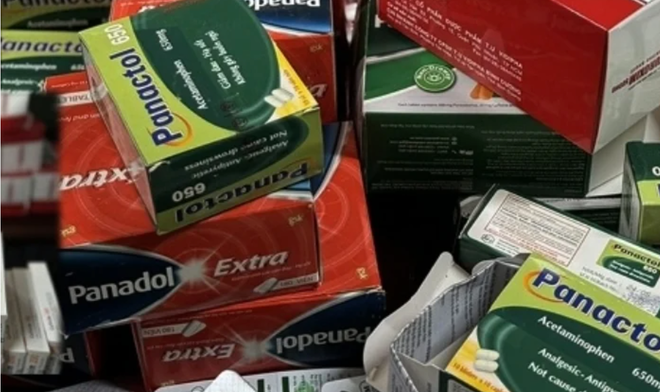
The subjects confessed to investing in production lines and machinery and researching the ingredients of modern medicine. Then, they ordered raw materials such as pharmaceuticals, medicinal herbs, and herbs of unknown origin, hired workers to mix and grind them into powder, used machines to form capsules, blister packs, and packaged the finished fake medicine, then sold it to the market through distribution channels.
According to the police, one of the new criminal activities that the subjects use is for drugs to treat bone and joint diseases. Accordingly, the subjects do not counterfeit available products circulating on the market but create their own drug names as well as company names based abroad, mainly in Hong Kong (China), Malaysia, Singapore... which can easily confuse consumers.
In addition, the subjects rented warehouses as production sites in deserted areas, dead-end alleys deep in alleys in Long Xuyen City, An Giang, Ho Chi Minh City and Hanoi, then hired workers who were relatives or acquaintances in other localities. During the production process, workers lived in closed warehouses, did not communicate with surrounding residents, causing difficulties for authorities in the process of management, inspection and collection of information and documents.
In the trade of counterfeit drugs on the market, the subjects with the method of participating in the chain have close connections and collusion with each other from the production stage to the stage of finding distribution channels to bring counterfeit products to the market to consumers. Under the guise of being pharmacists selling drugs for pharmaceutical companies, the subjects through social networking sites... advertise that there are sources of antibiotics from genuine companies "smuggled" from contractor sources or sold in other areas without being able to issue invoices, so they sell them at a cheaper price than genuine products.
For "fake" drugs of foreign origin, the subjects introduce these as "hand-carried" goods so there are no accompanying invoices and documents to gain the trust of buyers. In the stage of building trust, the subjects often buy real drugs mixed with fake drugs produced by the subjects to sell on the market to deal with inspections by authorities. After that, when there is a certain number of customers, the subjects only sell self-produced fake drugs, most of the customers are aimed at the group of pharmacists who sell drugs freely at the drug markets.
Use of blank test certificates
In the investigation of the fake functional food ring, the Investigation Agency identified the ring leader as Nguyen Nang Manh - Director of MegaPhaco Company, Chairman of the Board of Directors of MEDIUSA Pharmaceutical Joint Stock Company, headquartered in Hoang Mai District, Hanoi, and the subjects established businesses since 2015, including 6 companies. Dozens of tons of functional foods were the goods that the subjects in this ring transported to disperse and consume in Nam Dinh, which were discovered and seized by the police force. The police also discovered 2 other finished product warehouses in Hanoi.

According to the investigation agency, the seized goods were produced by the defendants themselves. The subjects also had factories that processed for other units. More than 900 brands of health protection foods were produced by the group, focusing on the elderly, children and pregnant women. The raw materials were announced by this company to be imported from the US and European countries, but in reality, most of the raw materials were imported from China.
The businesses, including 1 raw material import company, 2 manufacturing companies, 2 distribution companies and 1 packaging company, were set up by the subjects to legalize the process from input import to the consumption of fake functional foods nationwide.
The revenue of just one company in the system of 6 enterprises in this chain from 2021 to now has reached more than 800 billion VND. Many of the ringleaders in the chain started out as pharmaceutical representatives. The main method of consumption of the subjects is through the drug market system.
The subject Khuc Minh Vu - Director of Viet Duc Joint Stock Pharmaceutical Company (one of the links in the case), confessed to directly meeting with pharmaceutical representatives in the province, pharmacies in the province, or pharmaceutical distribution companies in the province to offer and introduce products. In order to legalize the procedures for declaring product quality, the subjects used fake test certificates. The subjects also admitted that in terms of product quality, many ingredients only met a small part of the declared quality.
In fact, the subjects counterfeiting medicine, milk and functional foods have organized professionally, no longer operating on a small scale but forming tight networks, establishing ghost companies, fake quality, fake certificates, and massive online advertising.
Technology for producing whole buckets and basins
The cases that have come to light have also shocked the public about the production technology of the criminals. In mid-May, the Hanoi Police Investigation Agency detained Pham Ngoc Tien, Luong Thi Yen, Nguyen Van Duc, Nguyen Thanh Tam and Nguyen Huu Tuan to investigate the act of producing and trading in counterfeit food, foodstuffs and medicines.
Raiding 20 locations related to pharmacist Pham Ngoc Tien, the police seized about 100,000 boxes, bottles, and blister packs of fake functional foods labeled "imported" with a mixing formula "composed" by Tien. The police also seized many types of machinery, production lines, and raw materials to produce more than 100 tons of fake functional foods and medical equipment, with about more than 100 different product codes.
The surprising thing about this case is not only the quantity of functional foods seized but also the technology used to produce them using an… unimaginable process. Tien used his knowledge as a pharmacist to create the formulas for the products himself. When purchasing medicinal herbs from various domestic sources, he assigned unqualified and unlicensed employees to mix them into capsules and package them into "imported" functional foods.
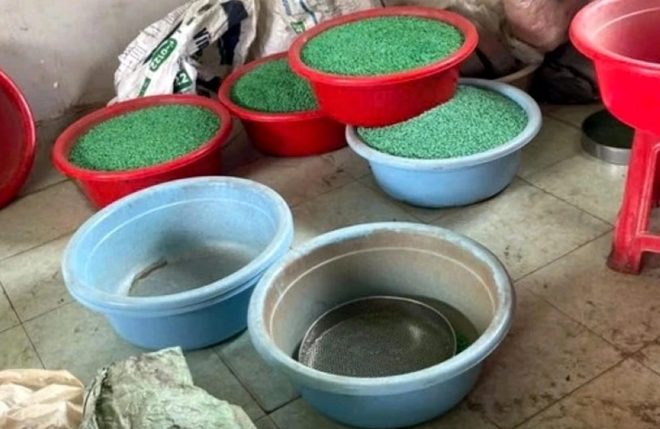
There have been more than 100 types of functional foods counterfeited. The products have one thing in common: they all have foreign labels. On the packaging, the products are from India, Spain, France and many other countries.
But according to the police investigation documents, these products actually originated from a warehouse located in Van Lam district (Hung Yen province). Functional foods have the effect of nourishing the brain, nourishing the liver, supporting the treatment of bone and joint diseases - but the production technology is only buckets, basins and ladles. Many types of powder with different colors are contained in raw material bags and mixed according to available formulas. The process of mixing raw materials for a batch of capsules labeled as imported goods takes place in unsanitary production conditions. With the speed of the automatic production machine, within just a few minutes, thousands of capsules are produced... Through the blister packaging line, they will immediately be labeled as imported goods from many different countries.
Captain Nguyen Duy Tuan Minh - Head of Team 7 - Economic Police Department - Hanoi City Police said that in reality, consumers feel secure when they see functional foods with foreign labels, imported from abroad. The subjects take advantage of that to create trust in people to commit violations.
The cases that have been exposed over time show a serious moral degradation among a segment of businessmen, who consider public health as a commodity to be traded and defrauded for profit and illegal gain. Notably, these subjects operate a smooth counterfeiting machine, making illegal profits on the health and trust of millions of people…/.
Source: https://www.vietnamplus.vn/niem-tin-bi-dau-doc-hang-gia-len-loi-tu-nha-thuoc-toi-benh-vien-post1041415.vnp


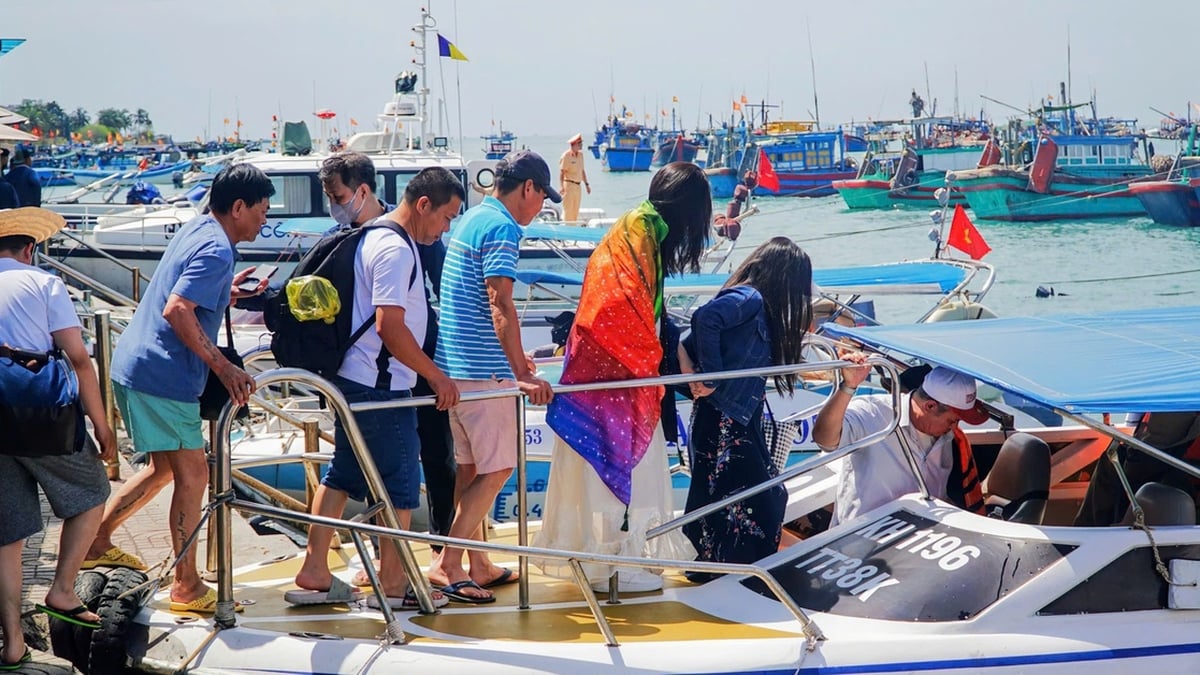
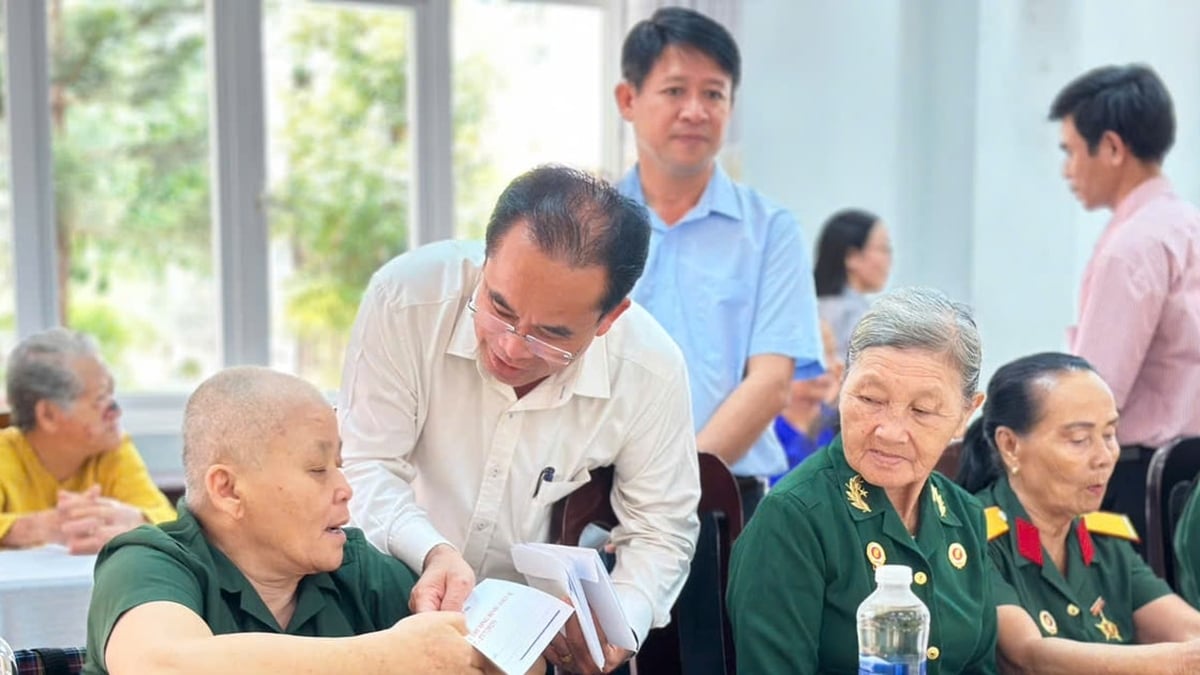
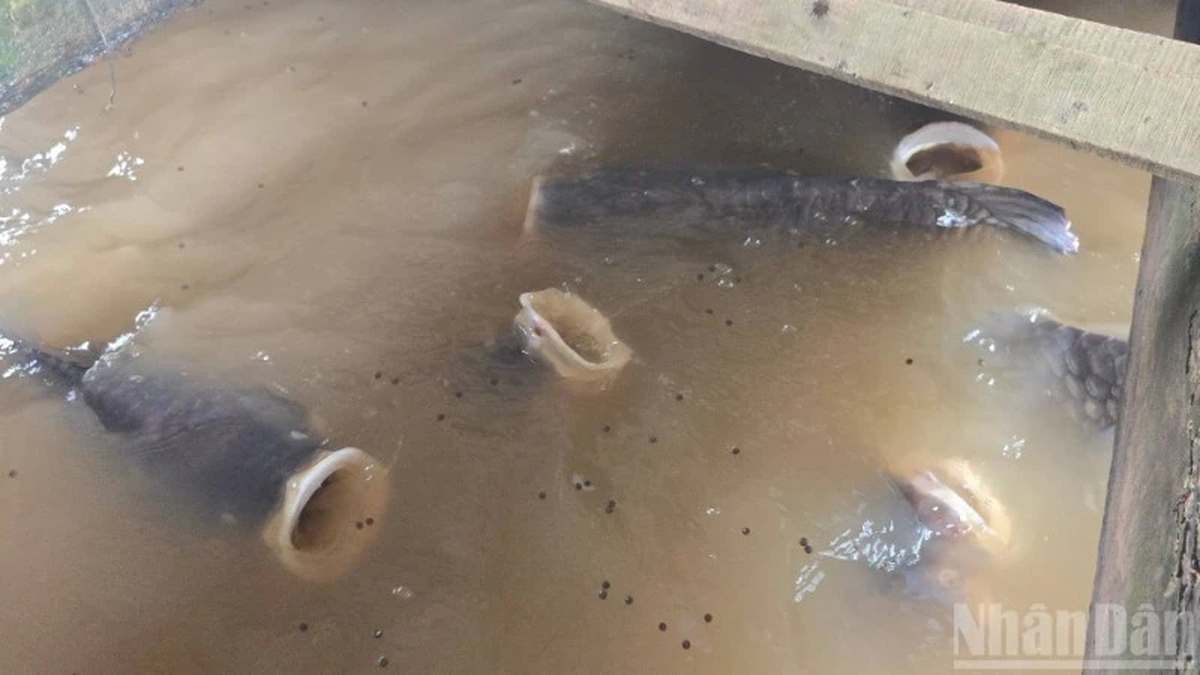



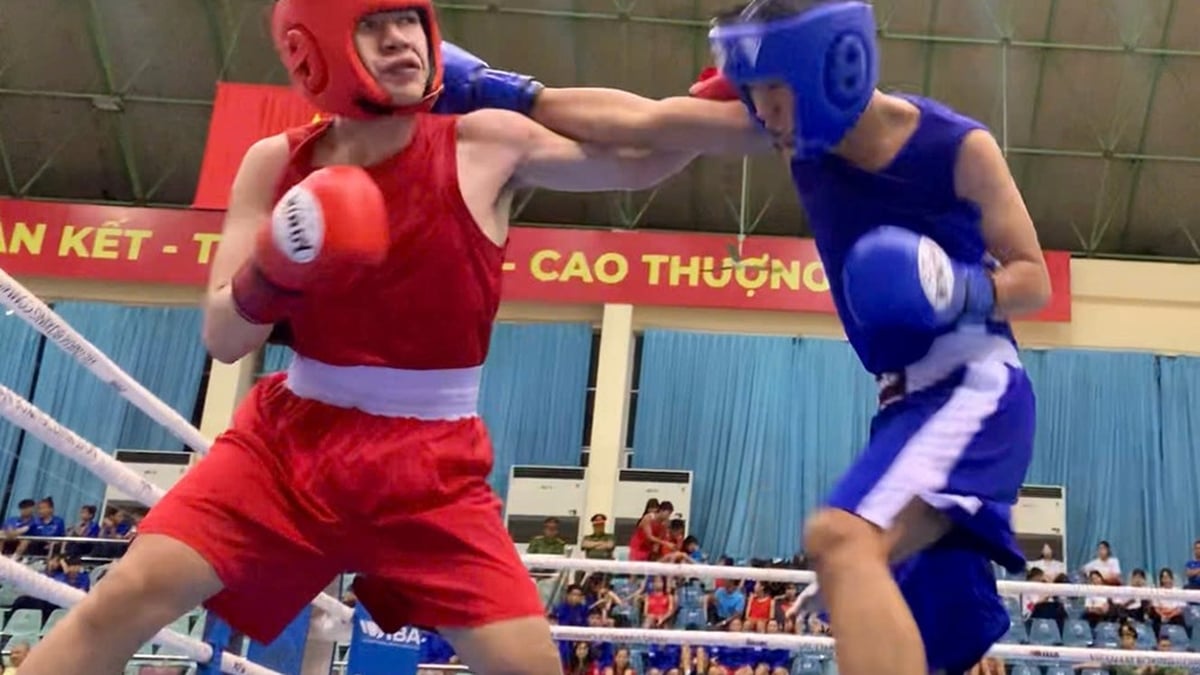
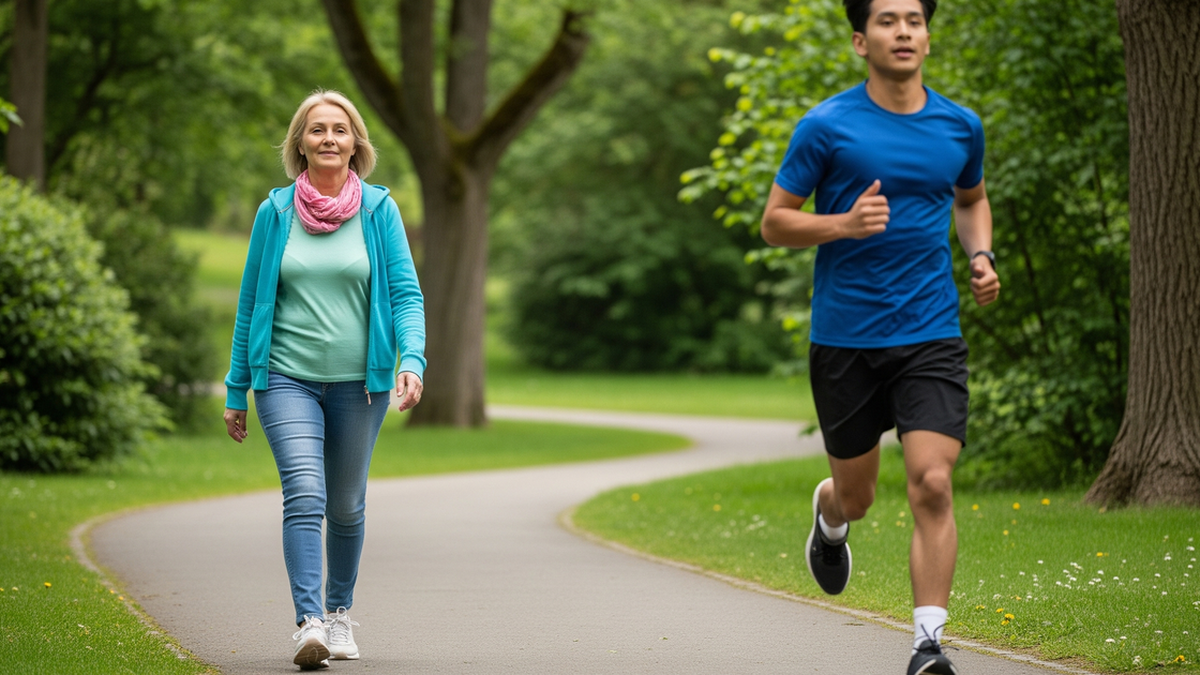
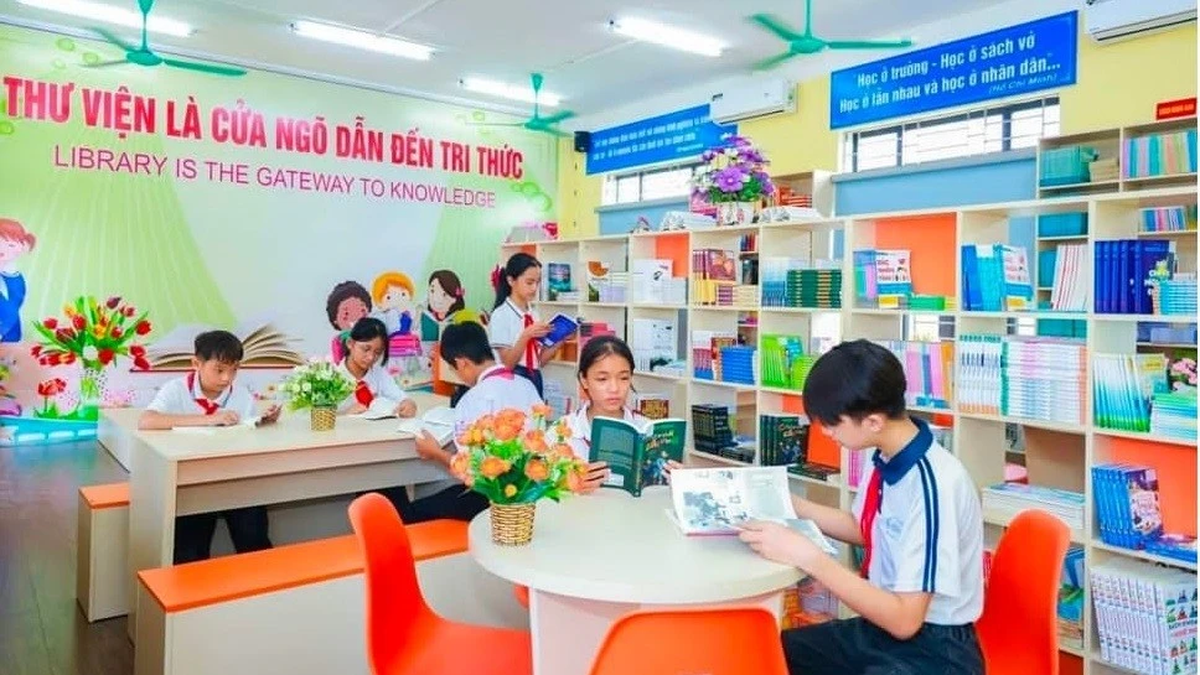
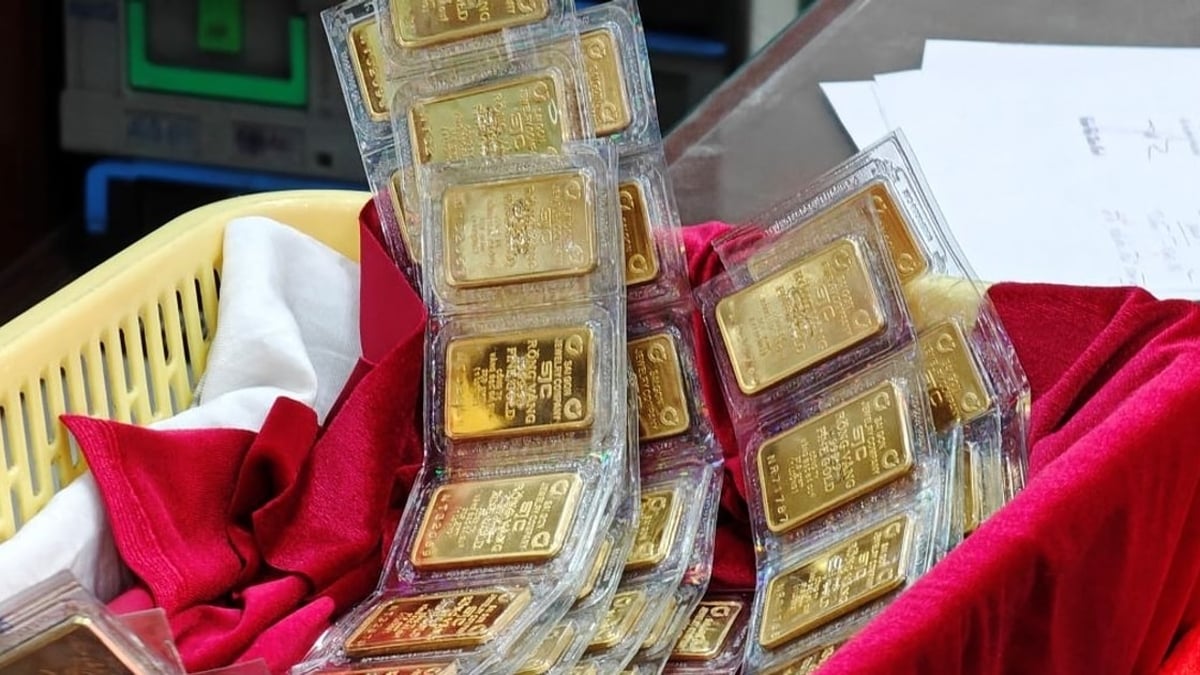


















![[Photo] National Assembly Chairman Tran Thanh Man visits Vietnamese Heroic Mother Ta Thi Tran](https://vphoto.vietnam.vn/thumb/1200x675/vietnam/resource/IMAGE/2025/7/20/765c0bd057dd44ad83ab89fe0255b783)




































































Comment (0)